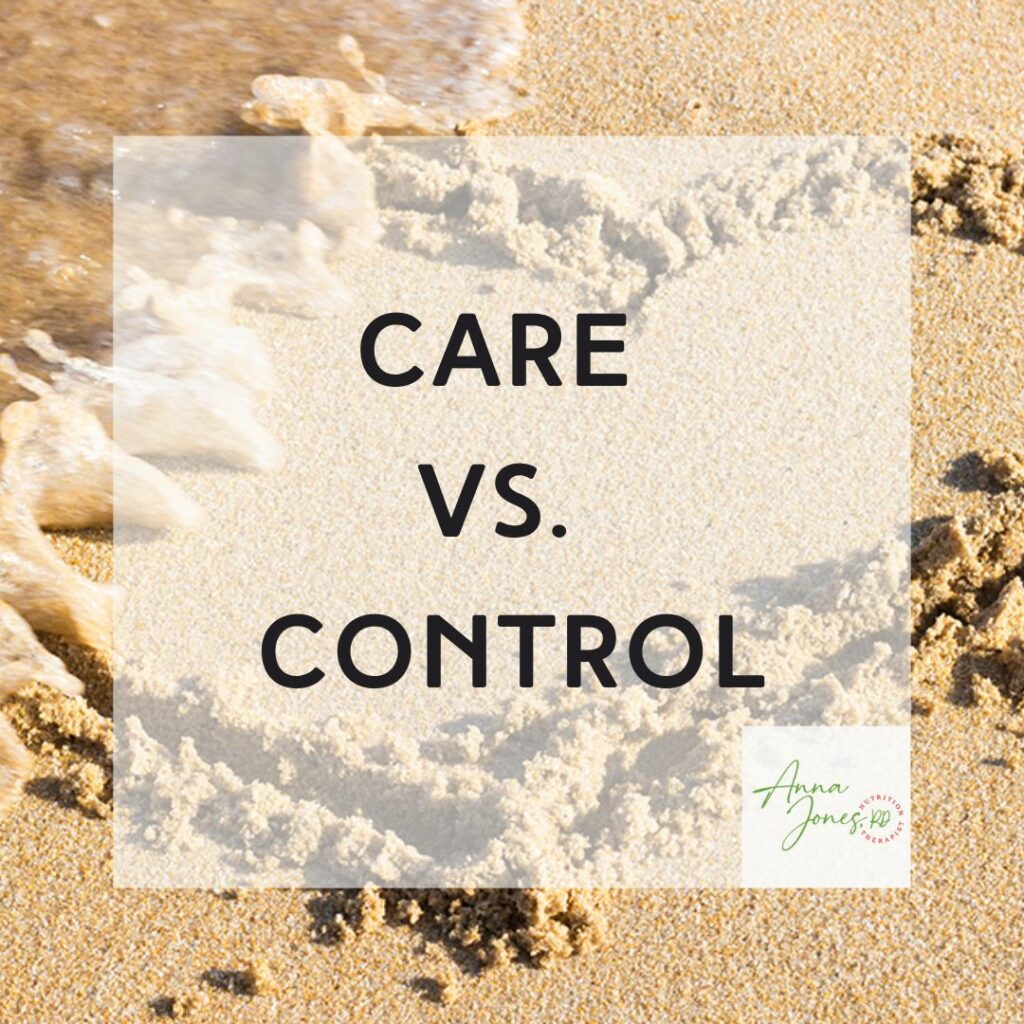
What is most important to you, caring for your body or controlling your body?
When thinking about food and movement has your approach to both mostly been about control or care?
I often have conversations with clients who it is clear to me need more self-care, both from themselves and others, in their lives. But instead of focusing on care, they express a strong desire to cut back, stop eating this or that, eat less, lose weight…take control.
Think about it. What have you learned more about, caring for your body or controlling it through food and exercise? For most the answer is control. So, it is only natural that our first response would be grasping for control.
The majority of us know no other way to approach our bodies than to try to control them. Our brains, from their all-or-nothing perspective, that is so strongly ingrained, tell us that if we aren’t “taking control” then we are giving up or letting ourselves go. We have learned from our culture, our upbringing…pretty much everywhere, that having a body means taking control.
We don’t even question this way of being in relationship with our bodies, food, and movement, because it is all we know.
Being in control sounds like a positive thing, and in some cases, it can be. But when it comes to our bodies and our relationship with food, control often leads away from caring for ourselves and meeting our body’s true needs.
What if there is another way?
A way that is more peaceful, joyful, and allows us to live life and stop fretting and trying to fix our bodies. Well, there is! It is about shifting from control to care. Here is a definition of both so we are on the same page.
Self-control
Self-control is usually rooted in wanting to change or manipulate our bodies through restriction or dieting or movement. With self-control we are typically fighting against our bodies needs and natural physiology. We are usually at odds with and denying our body’s true needs. Self-control drains you and zaps your energy.
Self-care
Self-care, as the name implies, comes from a place of caring and concern for yourself and your mental, emotional, and physical health and needs. It is about working with your body, not against it. Self-care refuels you and gives you more energy.
What does self-control look like?
Self-control comes easy for most of us. It is our go to when we don’t feel good in our bodies physically, mentally or emotionally. Below are some examples of the ways we try to take control of our bodies…
- Skipping meals or snacks in order to cut calories
- Feeling hungry but not eating
- Eating or drinking something you don’t like and isn’t satisfying because you are “supposed to”
- Restricting foods and food groups
- Planning what you eat or how you’ll move rigidly without flexibility
- Not having dinner with friends because you are out of your eating window or the restaurant they picked doesn’t meet your strict dietary needs
- Choosing types of movement we “should” do versus what we enjoy
- Feeling guilty when we don’t get our planned exercise in
- Eating “clean” all week and then having a cheat day or cheat meal on Saturday
- Letting willpower, “shoulds” and “shouldn’ts” rule choices around food instead of your preferences
- Making decisions about what you will eat based on food rules or numbers (calories, points, grams,etc.) versus your own preferences, enjoyment, and how it makes your body feel
- Weighing yourself and basing your worth, progress, or value on the scale
Any of these sound familiar? Any you can add? Many of these methods of control are so commonplace that they seem “normal,” oftentimes even considered healthy. They aren’t though. Putting forth so much effort to control leaves us depleted, exhausted, and burned out which is what leads to us swinging back and forth from on a diet to off a diet over and over again.
To build a more trusting, peaceful relationship with food, movement, and our bodies and get off the diet and control rollercoaster, a shift to self-care is key.
What does self-care look like?
Shifting to self-care allows us to tune in, align our actions with our body’s needs, and make choices that feel good. This then allows us a sense of autonomy or choice, which builds our confidence and ability to sustainably care for ourselves long term instead of in fits and starts.
Here are some examples of what self-care looks like for me…
- Spending time and energy to cook meals for myself and my family
- Eating regularly throughout the day to give my body the energy and nutrients it needs
- Spending quiet time with a cup of coffee doing a devotional to start the day
- Going for a gentle walk outside in beautiful weather to renew my energy
- Going to bed at a time that allows me to feel rested the next day
- Making time to move my body in ways I enjoy and that feel good
- Doing yoga or other gentle movement for both how it feels physically but mostly mentally and emotionally
- Playing tennis (and recently pickleball) because it feels good, makes me laugh, and is also social
- Planning for the grocery store so that I can have foods that I like on hand to nourish myself
- Saying “no” to certain things in my week that feel like too much to avoid feeling overwhelmed
- Connecting with friends in person or by text
- Carving out time in my week to just be and do nothing
- Monthly massages
- Seeking medical care from providers who honor and respect my needs and wishes
- Not weighing myself because weight is not what determines my health, behaviors are (weight is not a behavior)
Wrap Up
We all want to feel good in our bodies and to be healthy. Unfortunately, we have been taught and told that the only way to do that is through control or setting our entire intention and focus on weight loss. (Remember that intention fails somewhere around 95% of the time. Read this if you want to learn why…4 Reasons Diets Don’t Work (Hint: It’s Not You It’s Them.)
Feeling good in our bodies and being healthy doesn’t come from control, in fact the opposite is true. Instead, the way to feel good in our bodies and find sustainable physical, mental, and emotional health is through care.
Here are some things to consider:
- Is it true for you that self-care fills you and self-control drains you?
- Which of these ways of relating to your body, care or control, feels like it would be the most peaceful and sustainable?
- What self-care things are you currently doing (or do you want to do) that fill you?
- What self-control things are you doing (or have done in the past) that drain you?
We all have a choice in the way we are in relationship with our bodies. It is up to you what kind of relationship you want to have. If you can really relate to self-control, I encourage you to consider how has that felt for you in the past? Has it been helpful or harmful? What is one specific way you can switch gears from self-control to self-care?
I will end with this quote I love from the phenomenal book Untamed by Glennon Doyle
“The only thing that was ever wrong with me was my belief that there was something wrong with me. I quit spending my life trying to control myself and began to trust myself. We only control what we don’t trust. We can either control ourselves or love ourselves, but we can’t do both. Love is the opposite of control. Love demands trust. I love myself now. Self-love means that I have a relationship with myself built on trust and loyalty. I trust myself to have my own back, so my allegiance is to the voice within.”
Glennon Doyle, Untamed

0 Comments